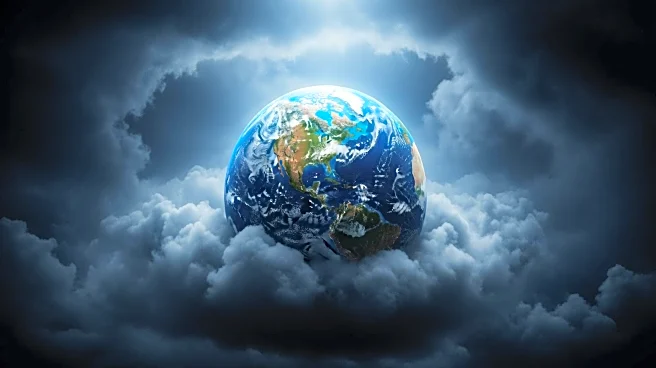What's Happening?
A group of leading scientists has issued a stark warning about the trajectory of global climate change, highlighting that humanity is on a path toward 'climate chaos.' The report, published in the journal BioScience, notes that the world burned record
amounts of oil, gas, and coal last year, leading to unprecedented levels of greenhouse gas emissions. This surge in fossil fuel use has been linked to extreme weather events, such as heat waves, storms, floods, and wildfires. The scientists emphasize that the planet's 'vital signs' are in critical condition, with record ocean heat, shrinking ice sheets, and increased forest fires. They call for urgent action to limit future warming by transitioning to clean energy, reducing meat consumption, and addressing overconsumption, particularly among the wealthiest populations.
Why It's Important?
The implications of this report are significant for global and U.S. policy, as it underscores the urgent need for systemic changes to combat climate change. The continued reliance on fossil fuels not only exacerbates environmental degradation but also poses severe risks to human health and safety. The report criticizes efforts by President Trump and his administration to boost fossil fuel production, which could hinder the transition to clean energy. The scientists argue that without bold, coordinated action, the world risks crossing dangerous climate tipping points, such as ice sheet collapse and permafrost thawing. This situation calls for international cooperation and leadership, especially as the U.S. steps back from environmental commitments.
What's Next?
The upcoming United Nations climate conference in Brazil presents an opportunity for countries to commit to transformative changes. The scientists urge nations to ignore any U.S. efforts to delay progress and to take decisive action to address climate challenges. The report suggests that solutions should include phasing out fossil fuels, protecting ecosystems, and promoting sustainable consumption patterns. The conference could serve as a turning point if countries agree to implement these changes, potentially mitigating the worst impacts of climate change.
Beyond the Headlines
The report highlights the ethical and social dimensions of climate change, pointing out that the wealthiest 10% of the world's population is responsible for two-thirds of the warming since 1990 due to high-consumption lifestyles. This raises questions about equity and justice in climate policy, as the impacts of climate change disproportionately affect poorer communities. The call for systemic change also challenges traditional economic models that prioritize growth over sustainability, suggesting a need to redefine progress in terms of environmental and social well-being.

















